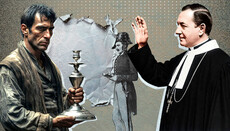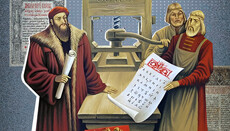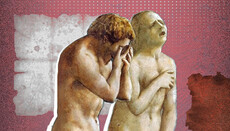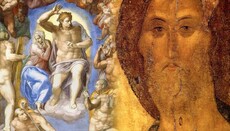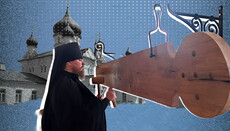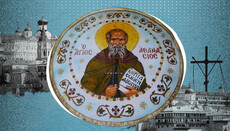“Picasso”: The Beginning of Seminary Life
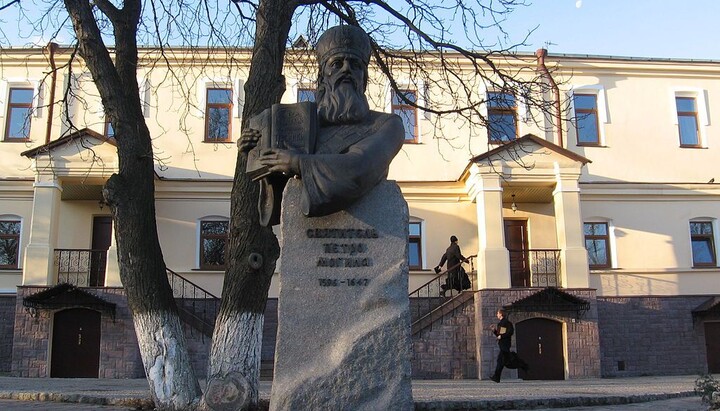
Excerpts from the book by Andrey Vlasov “Picasso. Part One: The Slave.” Episode 15.
Time: 1992
Place: Kyiv
Characters: Misha Kaminsky, Georgiy (his friend), seminarians, professors
Shortly before September 1, the students began arriving at the Kyiv Theological Seminary. Soon the dormitory, which had been home all summer to Misha, Georgiy, and a handful of other applicants, was filled with noise, chatter, and bustle. Once all the bunk beds were occupied, their quiet solitude came to an end. It was a shock! If earlier one could hear raindrops dripping from the ceiling during bad weather, now one had to raise one’s voice just to be heard. Sixty people packed into a few square meters – and everywhere bags, books, shoes, things, things, things… Walking between the beds was now difficult, and reaching the toilet or the washroom even harder.
Almost every bursak (seminary student) had brought a bag of food from home, lovingly packed by their parents. Most came from villages, and they were sent primarily lard, sausage, and other meat products. But it was August, the Dormition Fast was underway, there was no refrigerator in the dorm, and the heat was relentless. So most of this bounty had to be handed over to the seminary kitchen for communal use. Some, however, for reasons known only to themselves, decided to hold on to their provisions until the feast of the Dormition – and, naturally, they began to smell. Add to that the fact that not everyone was diligent about washing their socks – and Georgiy no longer complained about the lack of asceticism in their living conditions.
Despite everything, the first-year students looked up to the senior seminarians as if they were angels. After all, they had already been part of this sacred place for several years – the theological seminary! Each seemed a man of prayer, an ascetic, or at least a righteous person. And the professors – they were half-gods.
Finally, September 1 arrived. The day began with a prayer service in the Refectory Church for teachers and students, celebrated by His Beatitude Metropolitan Volodymyr himself, together with the seminary clergy. When he gave the first exclamation and the seminary choir thundered its many-voiced “Amen” in response, Misha’s soul soared to heaven. Never before had he heard such powerful, prayerful singing. The chant of the Kyiv-Pechersk Lavra, performed by what seemed like hundreds of voices, left no one unmoved. And the most wonderful thing was that he now belonged to this sacred brotherhood.
At the end of the service, His Beatitude addressed the students with a brief word of exhortation – which Misha, lost in his own fervent prayer, did not remember. He only prayed that one day his own voice might join that choir.
The first lesson was opened by the rector, Father Pavel. He looked like a typical secular professor, only wearing a cassock and cross – short hair, black with streaks of gray, and a small pointed beard.
When he entered, everyone jumped to their feet and stood at attention. He spoke quickly and abruptly.
“Sit down, brothers,” he said, motioning with his hand and taking the teacher’s seat. “At the start of your studies, I’ll say a brief word. Each of you knows why he came here. The Lord came not to be served, but to serve. And you must hold the same thought. The priesthood is not a job – it’s a ministry. You’ll feel that here. If you disagree, no one will keep you. If you realize this is not your calling – make room for others. We purposely enroll more students than needed, so there’s someone to expel.”
“You must thank God day and night for bringing you here. This isn’t a resort. But only here can you live beside the saints of the Kyiv-Pechersk Lavra. People travel from all over the world to visit the Caves – and you will have that blessing every day. When you finish your studies, become priests, and leave for your parishes, you’ll remember your seminary years and your life in the Lavra with longing. I repeat – only here can you daily visit the Caves, attend monastery services, and listen to our Lavra choir. Later you won’t have any of this. Cherish the time you have.”
“Remember this rule: obedience is greater than prayer and fasting. You’ll have plenty of obediences here. Perform them without question. Your main obedience is your study. Treat your teachers – whether clergy or not – with respect. Discipline here is strict. I oversee it myself, as do the inspector, his assistant, and the duty teachers. Three reprimands – and you’ll receive your ‘Magnification.’”
Misha and many others had already learned that in seminary jargon, the first reprimand was called a “Troparion.” It was an official written warning from the rector, posted on the seminary bulletin board. The second was a “Kondakion.” The third – the “Magnification” – meant expulsion.
Father Pavel continued:
“To you freshmen, everything now looks rosy. Everyone seems like angels, and the Lavra – paradise on earth. But soon you’ll start to grumble. The dorm’s too cramped, there’s too much work, the food’s bad. The soup’s not right, you’ll say. And tell me – where was a government soup ever right?”
The seminarians chuckled.
“In short,” the rector said, rising, “I wish you health and steadfastness in work and prayer. And also humility and patience. Now the assistant inspector will come and explain the rules and daily schedule.”
Everyone stood. The rector left, closing the door behind him.
A few minutes later, the assistant inspector entered – a young student of the Theological Academy named Nikolai. He taught Ukrainian history to the first-year class and helped maintain discipline. He carried himself with a slight air of superiority. He described the daily routine: wake-up, curfew, and the times and places of obligatory morning and evening prayers.
“At prayers, fathers, everyone must be present. Especially in the evenings. I or the duty teacher will take attendance. Anyone missing – Troparion. Anyone sneaking into town without permission – Troparion. Anyone skipping self-study in the library – Troparion.”
He went on for quite some time listing offenses that could earn a Troparion. Most of them the newcomers had never imagined. He exaggerated a little, clearly enjoying the intimidation.
“You’re all meek now,” he said. “As we say – rabchiki, little slaves of God. You fear everything, obey everyone, follow every rule. Later, you’ll settle in and divide into two groups: those who remain rabchiki, and those who become ‘gangsters’ – sneaking out, shirking work, indulging in forbidden drinks…” He paused meaningfully. “And such ‘gangsters,’ I’ll keep under personal supervision. Three reprimands – and Magnification.”
The second lesson was Catechism, taught by a short, round priest with a thin, syrupy voice – Father Veniamin. He entered, bowed to the icons in the corner, and sang a note. The class joined in: “O Heavenly King…” The singing was discordant, off-key – as befitted a first-year group at the start of term.
When they finished, Father Veniamin sang: “Sit down, brothers.” Then he briefly introduced himself and immediately began dictating.
“Open your notebooks, write: What is the Orthodox Catechism? The Orthodox Catechism is instruction in the Orthodox Christian faith, taught to every Christian for pleasing God and saving the soul. Write that down. Next: What is needed for pleasing God and for saving the soul? First, knowledge of the True God and right faith in Him; second, life according to faith and good works…”
And so on. The entire lesson – like all future ones – was spent copying word for word from the Extended Christian Catechism of the Orthodox Catholic Eastern Church by Saint Philaret (Drozdov). Rarely did Father Veniamin explain anything. By the end of class, everyone was dying of boredom and cramping hands.
After a short break, things got even worse.
The third lesson was History of the Russian Church, taught by a young archimandrite, Father Nestor.
“Remember, brothers, history is dates, names, and events. Got it? Open your notebooks. Date one…”
Another tedious session of dictation and rote copying – this time from Professor Znamensky’s History of the Russian Church.
“Scholasticism,” one freshman muttered during the break. “Hold on, brothers. One more lesson to go.”
The last class was Sacred History of the Old Testament. Everyone expected the same refrain – “History is dates, names, and events… write.”
Indeed, another priest entered, they sang “O Heavenly King,” sat down, and listened to his brief introduction.
“My name is Father Lavr. With God’s help, I’ll be teaching you Sacred History of the Old Testament.”
He was a man of average height, build, and age – everything about him was average, unremarkable. Even his walk and voice were forgettable. Only a few deep pockmarks marred one cheek.
The students sighed, opened their notebooks, and prepared for another dictation. But everything turned out quite differently.
“Today, brothers, we’ll talk about Christ. We know that Christ is the God-Man. As God, He is almighty, omnipresent, omniscient – Father Veniamin and later Father Sergiy will tell you all about that. But today we’ll speak about Christ as the Son of Man – and how, as man, He is especially close to each of us.”
Everyone put down their pens and listened.
“So, what can we say about Him – the Son of Man, our God, Christ? Suppose someone – an unbeliever, perhaps – asks us: What is your God like? Tell me about Him. What will we say?”
He paused, scanning the room. Silence. Finally, a timid voice from the back answered, “He’s kind.”
A few snickered at such simplicity – after all, they were serious theologians now. But Father Lavr silenced them with a wave.
“You’re right, brother… Let’s recall the last days of Jesus Christ’s life, His weeping over Jerusalem,” he said softly, eyes closed, quoting from memory: ‘Jerusalem, Jerusalem, you who kill the prophets and stone those sent to you! How often I wanted to gather your children together as a hen gathers her chicks under her wings, but you were not willing!’ “Now imagine, brothers, how safe those chicks feel under their mother’s wings.”
He looked around again. “And who can recall something else good that Christ did for people on earth? What do we know from the Gospel?”
Everyone began recalling at once – how the Lord pitied the poor newlyweds and turned water into wine; how He healed the sick, forgave sinners, never reproached them but gently led them to repentance. Father Lavr barely spoke – just called on students, letting them share. It was lively and joyful.
“And now, brothers,” he said, “let’s recall what good Christ has done for each of us.”
That question surprised everyone. Silence hung in the air – then it dawned on them that indeed Christ acts in each person’s life. Each one could remember moments when God’s hand was clear. Suddenly, all began recalling personal stories – prayers answered, sicknesses healed, moments of despair turned to strength. Someone had prayed for a loved one’s recovery and was heard; another for a ride on the road – and one came; another, crushed by grief, had found comfort. Someone simply stood once in church and felt that Christ was looking at him. Everyone had something.
“And now, brothers,” Father Lavr said, “imagine that just as Christ acts in each of our lives, so He acts in the life of all mankind – from the creation of the world to the Last Judgment. Whatever we discuss in Scripture – Old or New Testament – we’re really speaking about Christ: His love, His goodness, His providence.”
Someone raised a hand. “But that’s only in the New Testament. There’s nothing like that in the Old.”
“You’re mistaken, brother. The Lord Himself told the Pharisees, ‘Search the Scriptures, for in them you think you have eternal life; and they testify of Me.’ Remember: Christ and His saving mission are the main theme of all Scripture. Whatever book we read – the Pentateuch, the Prophets, or the historical books – Christ is at its center. And more than that – if we study all of human history carefully, we’ll see God’s action in it. Some of the Fathers wrote about this. Yes… Christ our God never abandons man. From the moment He formed him from the dust of the earth until the Last Judgment, when the Son of Man will judge all deeds, words, and thoughts – placing some on His right and others on His left, as a shepherd separates sheep from goats. Yes…”
He paused, stroking his beard.
“And now, brothers, let’s speak of a few simple rules to follow when reading Holy Scripture. The rules are as follows…”
But just then the door opened, and the inspector, Father Viktor, entered briskly. The seminarians jumped to their feet. The inspector nodded slightly to Father Lavr, signaling that the class was over – though the bell had not yet rung. Then he stood in the middle of the room, spreading his arms.
“All right, brothers. Those on my right…”
Everyone drew breath.
“…go to clean the grounds. Those on my left – unload the truck with vegetables.”
To be continued…
The previous episode of the book is available here.
